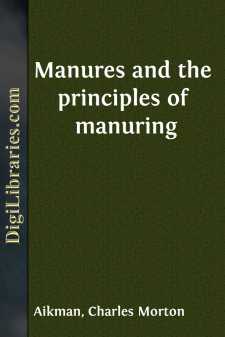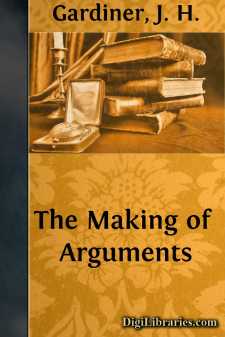Non-Classifiable
- Non-Classifiable 1768
Non-Classifiable Books
Sort by:
PREFACE. When the present work was first undertaken there were but few works in English dealing with its subject-matter, and hardly any which dealt with the question of Manuring at any length. During the last few years, however, owing to the greatly increased interest taken in agricultural education, the demand for agricultural scientific literature has called into existence quite a number of new...
more...
"The insect tribes of human kind" is a mode of expression we are familiar with in the poets, moralists and other superior persons, or beings, who viewing mankind from their own vast elevation see us all more or less of one size and very, very small. No doubt the comparison dates back to early, probably Pliocene, times, when some one climbed to the summit of a very tall cliff, and looking down...
more...
EVOLUTION. All subjects pertaining to our knowledge of the soul are too subtle to be weighed and proved by external intellect alone. Our lives are ruled by such a hotch-potch of inherited beliefs and tendencies, that it is almost impossible for us to use any discrimination concerning them; or to arraign ourselves before the tribunal of our own better judgment in such manner as to enable us to separate...
more...
ON THE NATURAL HISTORY OF THE MAN-LIKE APES Ancient traditions, when tested by the severe processes of modern investigation, commonly enough fade away into mere dreams: but it is singular how often the dream turns out to have been a half-waking one, presaging a reality. Ovid foreshadowed the discoveries of the geologist: the Atlantis was an imagination, but Columbus found a western world: and though...
more...
by:
Friedrich Engels
I. BOURGEOIS AND PROLETARIANS The history of all hitherto existing societies is the history of class struggles. Freeman and slave, patrician and plebeian, lord and serf, guild-master and journeyman, in a word, oppressor and oppressed, stood in constant opposition to one another, carried on an uninterrupted, now hidden, now open fight, a fight that each time ended, either in a revolutionary...
more...
by:
J. H. Gardiner
CHAPTER IWHAT WE ARGUE ABOUT, AND WHY 1. What Argument is. When we argue we write or speak with an active purpose of making other people take our view of a case; that is the only essential difference between argument and other modes of writing. Between exposition and argument there is no certain line. In Professor Lamont's excellent little book, "Specimens of Exposition," there are two...
more...
by:
John F. Runciman
CHAPTER I We once had a glorious school of composers. It departed, with no sunset splendour on it, nor even the comfortable ripe tints of autumn. The sun of the young morning shone on its close; the dews of dawn gleam for ever on the last music; the freshness and purity of the air of early morning linger about it. It closed with Purcell, and it is no hyperbole to say the note that distinguishes...
more...
by:
Jacob Abbott
Pyrrhus, King of Epirus, entered at the very beginning of his life upon the extraordinary series of romantic adventures which so strikingly marked his career. He became an exile and a fugitive from his father's house when he was only two years old, having been suddenly borne away at that period by the attendants of the household, to avoid a most imminent personal danger that threatened him. The...
more...
I "All talk on modern poetry, by people who know," wrote Mr. Carl Sandburg in Poetry, "ends with dragging in Ezra Pound somewhere. He may be named only to be cursed as wanton and mocker, poseur, trifler and vagrant. Or he may be classed as filling a niche today like that of Keats in a preceding epoch. The point is, he will be mentioned." This is a simple statement of fact. But though...
more...
LESSON I WHAT ARGUMENTATION IS I. The purpose of discourse II. The forms of discourse: 1. Narration 2. Description 3. Exposition 4. Argumentation When we pause to look about us and to realize what things are really going on, we discern that everyone is talking and writing. Perhaps we wonder why this is the case. Nature is said to be economical. She would hardly have us make so much effort and use so...
more...











